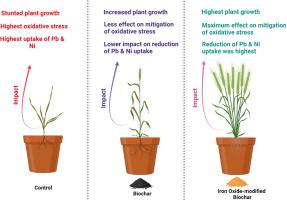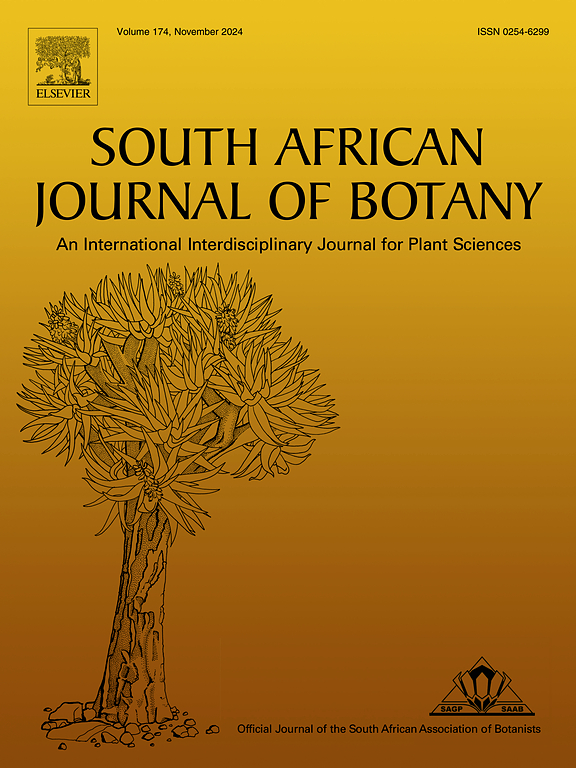Potential of iron oxide-modified biochar in simultaneous mitigation of lead and nickel toxicity in wheat (Triticum aestivum L.)
IF 2.7
3区 生物学
Q2 PLANT SCIENCES
引用次数: 0
Abstract
Lead (Pb) and nickel (Ni) contamination of soil is a global environmental threat, compromising agricultural productivity, human health, and ecosystems. Therefore, it is imperative to develop new and sustainable approaches for the mitigation of Pb and Ni toxicity in crop plants. In the current study, iron oxide-modified biochar (FMBC) was prepared and evaluated to determine its effectiveness in improving wheat growth and reducing Pb and Ni uptake by wheat plants. In the pot experiment, varying levels of pristine biochar (BC) and FMBC were incorporated into Pb- and Ni-contaminated soil. The data showed that growth of wheat plants was significantly improved by FMBC application at its highest level (1.5 %) resulting in increased root, shoot, husk, grain dry weights, and root and shoot lengths. Similarly, FMBC (1.5 %) significantly increased photosynthesis, transpiration rates, stomatal conductance, intercellular CO2, chlorophyll-a, and chlorophyll-b contents of wheat plants by 110.4 %, 44.5 %, 169.5 %, 47.6 %, 125 %, and 148 %, respectively. Plants treated with 1.5 % FMBC showed reduced oxidative stress in terms of suppressed hydrogen peroxide, electrolyte leakage, and malondialdehyde contents by 53.2 %, 52.7 %, and 41.3 %, respectively. FMBC application significantly reduced Pb and Ni bioavailability in soil and its uptake by plants. The FMBC amendment (1.5 %) decreased Ni concentrations in roots, shoots, husks, and grains by 31.6 %, 19.4 %, 24 %, and 24.3 % and Pb content by 60.1 %, 59.5 %, 79.6 %, and 76.1 %, respectively. The findings of the current study demonstrated that FMBC is an environment-friendly and sustainable amendment for reducing the risks associated with the uptake of Pb and Ni by wheat grown in contaminated soils.

氧化铁改性生物炭同时缓解小麦(Triticum aestivum L.)铅和镍毒性的潜力
土壤中的铅(Pb)和镍(Ni)污染是对全球环境的威胁,损害了农业生产力、人类健康和生态系统。因此,当务之急是开发新的可持续方法来减轻铅和镍对作物植物的毒性。本研究制备并评估了氧化铁改性生物炭(FMBC),以确定其在改善小麦生长和减少小麦植物对铅和镍的吸收方面的有效性。在盆栽实验中,将不同含量的原始生物炭(BC)和 FMBC 添加到铅和镍污染的土壤中。数据显示,施用最高浓度(1.5%)的 FMBC 能显著改善小麦植株的生长,从而提高根、芽、外壳、谷物干重以及根和芽的长度。同样,FMBC(1.5 %)也显著提高了小麦植株的光合作用、蒸腾速率、气孔导度、细胞间 CO2、叶绿素-a 和叶绿素-b 含量,增幅分别为 110.4 %、44.5 %、169.5 %、47.6 %、125 % 和 148 %。经 1.5 % FMBC 处理的植物氧化应激减少,过氧化氢、电解质渗漏和丙二醛含量分别降低了 53.2 %、52.7 % 和 41.3 %。施用 FMBC 能明显降低土壤中铅和镍的生物利用率以及植物对它们的吸收。添加 FMBC(1.5%)后,根、芽、果壳和谷物中的镍浓度分别降低了 31.6%、19.4%、24% 和 24.3%,铅含量分别降低了 60.1%、59.5%、79.6% 和 76.1%。目前的研究结果表明,FMBC 是一种环境友好型和可持续的改良剂,可降低在受污染土壤中种植的小麦吸收铅和镍的风险。
本文章由计算机程序翻译,如有差异,请以英文原文为准。
求助全文
约1分钟内获得全文
求助全文
来源期刊

South African Journal of Botany
生物-植物科学
CiteScore
5.20
自引率
9.70%
发文量
709
审稿时长
61 days
期刊介绍:
The South African Journal of Botany publishes original papers that deal with the classification, biodiversity, morphology, physiology, molecular biology, ecology, biotechnology, ethnobotany and other botanically related aspects of species that are of importance to southern Africa. Manuscripts dealing with significant new findings on other species of the world and general botanical principles will also be considered and are encouraged.
 求助内容:
求助内容: 应助结果提醒方式:
应助结果提醒方式:


